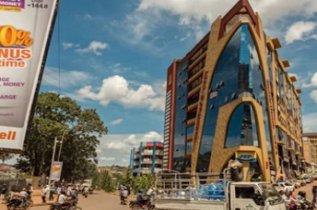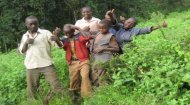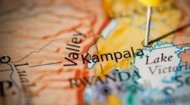|
Geographically positioned in Central Uganda, just north of the equator, and nestled amidst a verdant landscape dominated by rolling hills and the serene expanse of Lake Victoria, Kampala enjoys a pleasant, tropical climate, modulated by its altitude. The city's landscape is famous for its undulating hills, each often crowned by a significant institution or landmark, contributing to its unique character. From the administrative centre on Nakasero Hill to the religious sites atop Rubaga and Namirembe, these elevations tell tales of power, faith, and progress.  Kampala's economic profile is the undisputed engine of Uganda. It hosts the country's main financial institutions, educational establishments, and industrial zones. The city is a melting pot of cultures and ethnicities, reflecting Uganda’s diverse population and attracting people from across East Africa and beyond seeking opportunities. This confluence of people fuels a thriving informal sector, bustling markets, and a burgeoning creative scene, making Kampala a lively and somewhat chaotic hub of activity that embodies the spirit of African ingenuity and resilience. Kampala's economic profile is the undisputed engine of Uganda. It hosts the country's main financial institutions, educational establishments, and industrial zones. The city is a melting pot of cultures and ethnicities, reflecting Uganda’s diverse population and attracting people from across East Africa and beyond seeking opportunities. This confluence of people fuels a thriving informal sector, bustling markets, and a burgeoning creative scene, making Kampala a lively and somewhat chaotic hub of activity that embodies the spirit of African ingenuity and resilience.
Kampala offers a diverse array of attractions that cater to varied interests, from historical marvels and cultural landmarks to natural beauty and vibrant markets.
- Kasubi Royal Tombs (Muzibu-Azaala-Mpanga): A UNESCO World Heritage Site, these traditional grass-thatched structures (above, left) are the burial grounds for four former Buganda kings (Kabakas). While parts were tragically destroyed by fire in 2010, reconstruction efforts are ongoing, preserving its spiritual and cultural significance as a masterpiece of Ganda architecture and a symbol of royal heritage.
Uganda Museum: The oldest museum in East Africa founded in 1908, it houses an extensive collection of Uganda's cultural heritage, natural history, and archaeological findings, offering deep insights into the country's diverse past and present.
- Gaddafi National Mosque (Uganda National Mosque): Located on Old Kampala Hill, this grand mosque, commissioned by former Libyan leader Muammar Gaddafi, offers breathtaking panoramic views of the entire city from its minaret. Its impressive architecture and mosaic designs are a sight to behold.
- Buganda Parliament (Bulange) & Kabaka's Palace (Lubiri): These iconic structures represent the enduring strength of the Buganda Kingdom. The Bulange is the seat of the Buganda Lukiiko (parliament), while the Lubiri is the official residence of the Kabaka. A historical pathway, known as "The Royal Mile," connects the two, symbolizing the king's journey to address his people.
- Baháʼí House of Worship: Perched on Kikaya Hill, this tranquil and architecturally unique temple is the only Baháʼí House of Worship in Africa. Its serene gardens and peaceful atmosphere offer a stark contrast to the city's bustle.
- Namugongo Martyrs Shrine: A significant pilgrimage site for Christians, this shrine commemorates the 32 young converts who were executed on the orders of Kabaka Mwanga II in the late 19th century for refusing to renounce their faith.
- Nommo Art Gallery: The home of Uganda's developing visual arts and the craft shops around Buganda Road close to the National Theatre.
- Owino (Balikuddembe) Market: For a truly immersive experience of local life, Owino Market is an exhilarating assault on the senses. It’s one of East Africa’s largest open-air markets, offering everything from clothes and electronics to fresh produce and local crafts.
- Craft Markets: Dedicated craft markets like the one behind the National Theatre offer a vast selection of local artistry, perfect for souvenirs and gifts.
In terms of Kampala's social profile, the city is home to around 4,265,000 residents (2025), a steep rise from 330,700 in 1969 and is mostly Anglican in nature with a Muslim population of around 10%. It stands as a city of remarkable contrasts and resilience. Its ancient royal heritage coexists with modern skyscrapers, its bustling markets hum alongside serene religious sites, and its challenging past informs a hopeful future. For those seeking to understand the heart of Uganda, Kampala offers an unforgettable journey into a vibrant tapestry of history, culture, and relentless progress.
|


 The city's modern genesis can be traced to the late 19th century when Captain Frederick Lugard of the Imperial British East Africa Company established his fort on Old Kampala Hill in 1890. This strategic location served as the colonial administrative headquarters, laying the foundation for what would become the British Protectorate of Uganda. As colonial rule solidified, Buganda's capital, Mengo, was gradually integrated with the British administrative centre. Over the decades, infrastructure developed, and the city began to take shape, serving as the nucleus of colonial power and commerce.
The city's modern genesis can be traced to the late 19th century when Captain Frederick Lugard of the Imperial British East Africa Company established his fort on Old Kampala Hill in 1890. This strategic location served as the colonial administrative headquarters, laying the foundation for what would become the British Protectorate of Uganda. As colonial rule solidified, Buganda's capital, Mengo, was gradually integrated with the British administrative centre. Over the decades, infrastructure developed, and the city began to take shape, serving as the nucleus of colonial power and commerce.



 Kampala's economic profile is the undisputed engine of Uganda. It hosts the country's main financial institutions, educational establishments, and industrial zones. The city is a melting pot of cultures and ethnicities, reflecting Uganda’s diverse population and attracting people from across East Africa and beyond seeking opportunities. This confluence of people fuels a thriving informal sector, bustling markets, and a burgeoning creative scene, making Kampala a lively and somewhat chaotic hub of activity that embodies the spirit of African ingenuity and resilience.
Kampala's economic profile is the undisputed engine of Uganda. It hosts the country's main financial institutions, educational establishments, and industrial zones. The city is a melting pot of cultures and ethnicities, reflecting Uganda’s diverse population and attracting people from across East Africa and beyond seeking opportunities. This confluence of people fuels a thriving informal sector, bustling markets, and a burgeoning creative scene, making Kampala a lively and somewhat chaotic hub of activity that embodies the spirit of African ingenuity and resilience.


